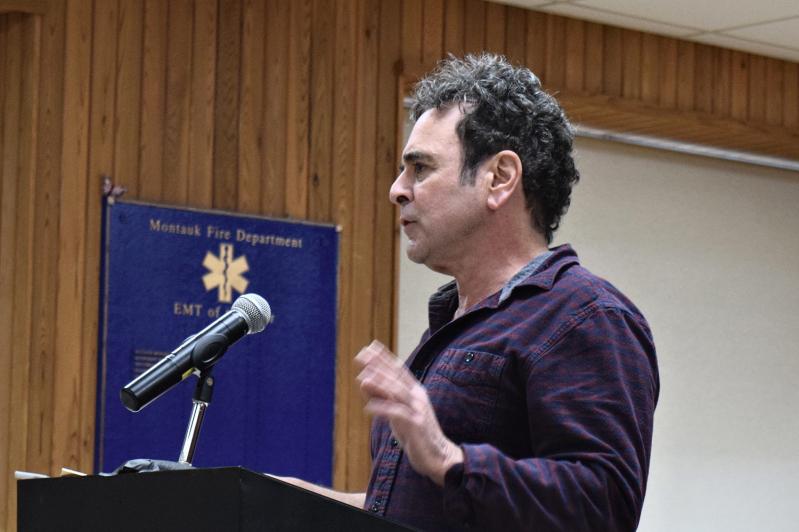Eight months after dozens of amateur and professional musicians crowded East Hampton Town Hall to protest proposed changes to the music entertainment permit required of commercial establishments, the town board on Tuesday considered a new set of revisions recommended by its business advisory committee.
Several musicians again turned out, this time at the Montauk firehouse, to argue that the proposed amendments were unduly burdensome, discouraging restaurants and bars that want to offer live music from even seeking a permit, and thus affecting performers’ ability to make a living.
Paul Monte, chairman of the business advisory committee and president of the Montauk Chamber of Commerce, detailed the committee’s recommendations for changes that it believes business owners would find acceptable.
In March, the town board debated proposed amendments that it said were aimed at public safety — particularly overcrowding — and preventing the expansion of use in commercial venues. Those changes would have allowed the town clerk to deny approval of a permit based on two or more prior town code convictions, within the previous 36 months, pertaining to music entertainment, fire prevention, special events, noise, or zoning. (Current rules stipulate 18 months without such a conviction.) Establishments seeking music entertainment permits would have had to provide a floor and seating plan, including the location of the entertainment.
Board members explained that a small number of venues, primarily in Montauk, repeatedly flout regulations, not only impacting quality of life but endangering public safety. But critics called the proposed revisions draconian and mean-spirited, and on Tuesday, despite the board’s retreat on several of the initial proposals, the attending musicians sang a familiar refrain.
The proposed legislation “targets our industry, which is a creative industry and a big part of our growing economy, our resort economy,” said Thomas Muse of Montauk. “Don’t we want to build a community where arts is a priority and it’s reflected in our legislation?” Existing laws and code enforcement officers should suffice in maintaining order, he said.
Joe Lauro, who lives in Sag Harbor, said that proposed revisions were “insulting to me,” complaining that live music is “equated with leaf blowers” — nothing more than noise.
“Music is an essence of our town,” said Nancy Atlas of Montauk. “We aren’t living in Kansas here.” Of the board’s efforts, she said that “we are slowly and methodically killing an essence of this town. . . . It is our job as musicians and artists to stand up to this so that we keep that tradition alive and, not only that, to help it flourish.”
Lynn Calvo, of Lynn’s Hula Hut in Montauk, told the board that offering live music “is the way I make money.” And Alfredo Merat echoed other speakers who said there should be no music permit at all. “There’s music everywhere, amplification everywhere,” he said. “It’s a matter of sound level, and I think a matter of respecting your neighbor. Just make it about decibels.”
But Councilwoman Sylvia Overby said at the outset that “we heard the community loud and clear” in March. Revisions to the initial proposal were intended to give due process to establishments cited for code violations, she said.
As he had emphasized in March, Supervisor Peter Van Scoyoc told the assembled that “the goal is not to further restrict music.” Rather than revoking a permit based on violations that have yet to be adjudicated, “whoever has been cited should have their day in court,” he said. “Revocation could only occur after they’re actually convicted of these violations.”
Mr. Monte submitted several of the business advisory committee’s recommendations. Amendments to the music permit code should remove references to fire prevention, he said, leaving only noise violations and breaches of the code itself as “convictable violations leading to revocation or denial of a permit.” Language granting discretion to the town clerk with respect to issuing music permits should be deleted and replaced with that allowing only the power to grant or deny such permits, he said.
Appeals should be referred to the town’s licensing review board, rather than the town board, for final determination, he said, and the review board should be expanded to include those familiar with music and restaurants. Ms. Overby voiced support for such an expansion.
Any amended version of the code should be effective Jan. 1, 2020, and there should be no carryover of convictions from prior years, Mr. Monte said, adding that the number of convictions needed for revocation or denial of a permit should be three within a given year, and not within the previous 36 months as in the initial proposal. Mr. Van Scoyoc said that three convictions in a calendar year “points to an ongoing problem within a particular year,” allowing the town to identify venues responsible for the bulk of the infractions that the proposed amendments are intended to address.
Councilwoman Kathee Burke-Gonzalez said she could “understand how business owners would be reluctant to bring in live music because they’re concerned about these convictions. We have to be careful about . . . trying to find the right balance, because we want music.”
Mr. Van Scoyoc had a different point of view. “To me, if I’m a business owner and have a permit, I would want to have musicians come in. . . . I would want to make sure I maintain that permit, which means being careful about obeying regulations and rules.” The board, he said, is “still trying to find that balance between what we all want to have happen, but doing so within some boundaries, because we know when it gets out of balance, the repercussions of that are also dire.”
“There will be further discussion with the music community” before another public hearing and vote on revising the code, the supervisor said, adding that the board supports musicians, “which we all recognize and believe are an important aspect of life here.”




